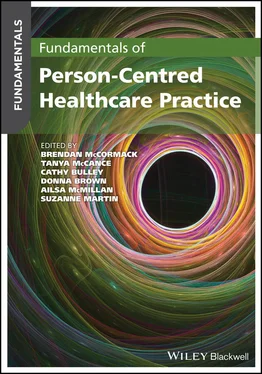1 ...8 9 10 12 13 14 ...26 In writing your reflection, you might have considered ways in which you respect others as persons and how this respect translates into your ways of being and how you translate those ways of being into your practice. You might have also focused on ‘the individual’ and the importance of respecting individuality. This is a common focus in twenty‐first‐century society where respect for the person is often translated into an individualistic perspective where rights, expectations and demands shape our politics, sociocultural norms and behaviours, relationships and societal values. Indeed, some would argue that we have become so dominated by individualism that core values of ‘community’ have been eroded, leading to a breakdown of society and its supportive interconnected relationships (Everingham 2018).
New and innovative technologies in genetic research, expansion of the genome and the development of treatments that are highly individualised and personalised (e.g. personalised medicine) mean that healthcare professionals have to work in very different ways from those articulated in early writings about care and caring. Such developments have also influenced how healthcare teams are formed, how interdisciplinary practice is understood and operationalised and how knowledge and evidence is used in practice. Thus person‐centred practice cannot be understood in simplistic terms of ‘caring for a person’ or ‘providing care to a person’ or ‘working therapeutically with a person’ but instead needs to embrace a variety of individual, personal, contextual and political attributes that shape how we provide healthcare.
You can read more about these issues in the context of the development of person‐centredness as health strategy in McCormack et al. (2017) and in the context of research in van Dulman et al. (2017).
Person‐centredness and related concepts
We need to challenge individualistic views of persons and person‐centredness, especially in healthcare, where shared values, team identity, organisational cultures and norms have a major effect on how we work and how service users experience healthcare. In Chapters 13and 16, this is discussed in the context of ‘human agency’ and providing holistic care. We are all ‘persons’ and so the values of person‐centredness need to apply to all of us in any context – this is why person‐centredness and person‐centred practice are not just about ‘patient care’ but instead these core values apply to all persons. This is one of the clear distinctions between person‐centredness and other similar concepts, such as patient‐centredness, client‐centredness, woman‐centredness and child‐centredness. We define some of these associated concepts in Table 2.2.
Table 2.2 Associated concepts
| Concept |
Definition |
| Patient‐centredness |
Patient‐centred care seeks to ensure that the needs of individuals requiring care are met with respect and responded to as persons, through respect for their values, preferences, choices and relationships and is inclusive of the individual’s family |
| Client‐centredness |
Client‐centred care originates from the work of Carl Rogers (1961) and his approach to psychotherapy (also called person‐centred therapy). By using the term ‘client’ instead of ‘patient’, Rogers placed importance on the individual seeking assistance, making autonomous decisions and engaging in self‐work to overcome their difficulties. Self‐direction is a central principle in client‐centred practice and the role of the nurse is that of ‘professional guide’ |
| Woman‐centredness |
Woman‐centred care is a term used to describe a holistic philosophy of maternity care that recognises each woman's biopsychosocial, emotional and spiritual needs as defined by her own context |
| Child‐centredness |
Child‐centred care means placing children and their interests at the centre of practice and recognises children and young people as active participants in their care |
| Family‐centredness |
Family‐centred care is a term used in healthcare services for children and young people. It means that a child in need of care can never be considered as a single individual patient, but that the family is the unit of care as the parents and wider family are central to the child's health and well‐being |
| Relationship‐centredness |
Relationship‐centred care originates from the work of Nolan et al. (2004). It emphasises the promotion of positive relationships in meeting the needs of persons needing care as well as relatives/friends and staff |
These associated concepts may have some similarities with person‐centredness, as they may share some of the values of personhood, but not all. You may also notice that not all persons are considered equal in some of these perspectives and that they differ according to the emphasis they place on the power relationship, the focus of the relationship and equality of decision making.
Dear Oscleans,
I am writing to you to welcome you to our planet. We as a planet of people who care for one another are moving towards becoming more person‐centred. I am aware that you are not familiar with the term person‐centred, therefore, this letter aims to provide you with an understanding of what it means to be person‐centred. Moreover, I hope to provide you with my understanding of person‐centredness and how my learning on the topic has changed the way I view my practice. McCormack and McCance (2017, p. 41) have provided a definition of person‐centredness:
person‐centredness focuses on the formation and fostering of healthful relationships with service users and others significant to them in their lives, as well as between all care providers. It is underpinned by values of respect for persons (personhood), individual right to self determination, mutual respect and understanding. It is enabled by cultures of empowerment that foster continuous approaches to practice development.
The idea of person‐centredness has been formed from the theory of personhood which has been widely described in the literature. Many scholars have presented their views of the theory. One philosopher who has written about what it means to be a person is Immanuel Kant who believed that personhood was the ability for a person to think and act morally and this is what differentiated humans from other species (von Bertalanffy 1968). His philosophy is one which I most associate with. It is what I consider to be the basis of the care that I provide. My view of person‐centredness and particularly person‐centred practice is that it is focused largely on being with the person and connecting on a human level. I believe that the most person‐centred care I provide is when I have been completely authentic with a family. This has included connecting with them on a personal but professional level and remaining transparent throughout my work with them. I encourage the families with whom I have worked to speak freely about their concerns and I have been sympathetically present. I have shared my knowledge with them and worked in partnership to come up with a decision that is suited to their needs.
In addition, I believe that in order to engage authentically with families it is important to recognise our own limitations. A large part of shared decision making with parents and families requires having adequate knowledge/information about a particular illness or treatment. As I am still at the beginning of my career as a specialist community health nurse, I am aware that I do not always have the correct knowledge or information to share with families. Therefore, in order to engage authentically, I inform them of my limitations in knowledge and state that I will seek the correct information in order to support them in making the best decision for their child. This has been generally well received and on reflection it appears that most families appreciate honesty and transparency. So, as I start my career as a newly qualified specialist community health nurse, I will continue to be honest about the extent of my knowledge with families and ensure that I signpost them to the relevant service that will be able to better inform them. Ultimately, my view of person‐centred practice has moved on and I have learned that is important to work towards ‘person‐centred moments’ and increasing the frequency of these moments in practice to create a context where person‐centred practice can be realised.
Читать дальше












